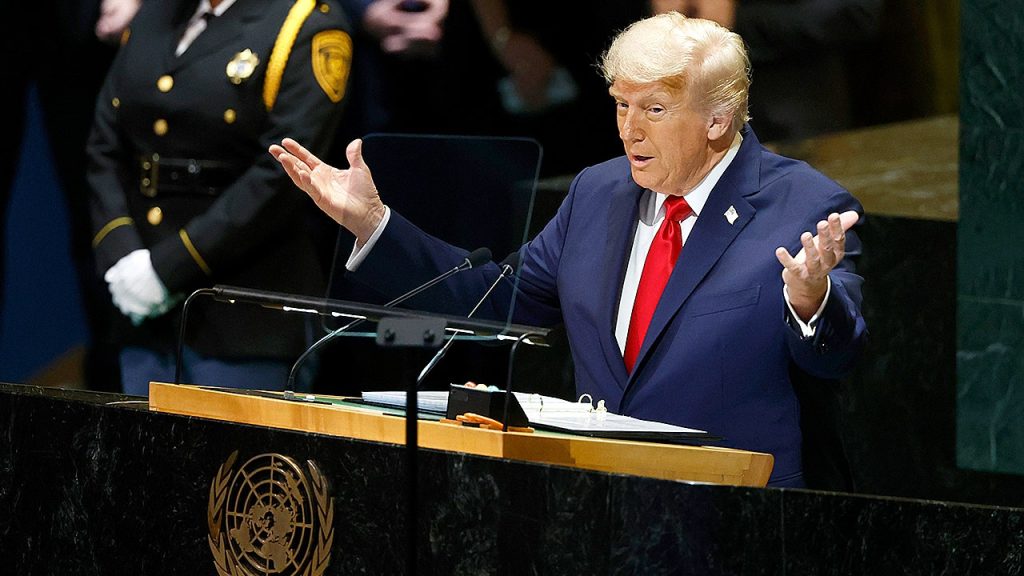Trump Shakes Up the United Nations with Bold, Unscripted Address
In a remarkable departure from diplomatic norms, former President Donald Trump delivered an unscripted speech at the United Nations General Assembly that left world leaders both amused and unsettled. When his teleprompter failed, Trump leaned into his characteristic bluntness, challenging the very purpose of the United Nations while recounting his own foreign policy accomplishments. “What is the purpose of the United Nations?” Trump asked pointedly, after claiming he—not the UN—had ended seven wars. His address touched on every major UN priority—climate change, Ukraine, refugee resettlement, and Palestinian statehood—rejecting them all with a directness that drew occasional laughter but also visible discomfort from the assembled dignitaries. Trump’s criticism of the UN’s effectiveness was particularly sharp, mocking its reliance on “strongly worded letters” and expensive renovation projects while questioning its relevance in solving global conflicts. Latvian Foreign Minister Baiba Braže acknowledged Trump’s sweeping agenda, noting that while Europeans still value the UN framework, they recognize the need for reform and increased efficiency.
Trump’s dismissal of climate change as “the greatest con job ever perpetrated on the world” represented perhaps his starkest break with UN orthodoxy. Deriding the entire concept of carbon footprints as “a hoax” and green energy initiatives as “all bankrupt,” he rejected decades of international climate work in a single stroke. “No more global warming, no more global cooling, whatever the hell happens, it’s climate change,” Trump declared mockingly. This position stands in dramatic contrast to the UN’s view of climate change as an existential threat requiring coordinated global action. European leaders, while acknowledging the need for UN reforms, maintained their commitment to the international body as the central forum for addressing global challenges. The clash highlighted fundamental differences in worldview between Trump’s America-first approach and the multilateral ethos that has guided international climate policy for years.
On Ukraine, Trump struck a more complex note, aligning with the international community’s desire for peace while sharply criticizing European allies for their continued energy relationship with Russia. “They’re buying oil and gas from Russia while they’re fighting Russia. It’s embarrassing to them,” Trump charged, threatening tariffs unless Europe severed these ties. He extended his criticism to India and China, labeling them the “primary funders of the war” through their Russian fuel purchases. Estonian Foreign Minister Margus Tsahkna found common ground with Trump’s assessment that “Russia is defeatable” and echoed his concern about Russian energy exports funding the war effort. Trump’s assertion that the conflict “would never have started if I were president” reflected his longstanding criticism of the Biden administration’s approach to Russia, though his promise of “a very strong round of powerful tariffs” if Russia refuses peace introduced a new element to his position.
Migration emerged as another flashpoint in Trump’s address, as he reframed what the UN views as a humanitarian challenge into what he termed an “invasion.” He directly accused the international body of financing illegal immigration into the United States through its humanitarian assistance programs. “The UN is supposed to stop invasions, not create them and not finance them,” Trump declared. His claims that Europe is being “ruined” by uncontrolled migration and that migrants in London want to impose “Sharia law” drew particular attention. Braže offered a nuanced response, explaining that Baltic States share some skepticism about uncontrolled migration due to their historical experience under Soviet occupation: “For us in the Baltics, immigration has always been something that we are quite skeptical about… today we are very clear that our borders are our borders, we control them.” The exchange highlighted how regional historical experiences shape contemporary migration politics.
Trump’s rejection of Palestinian statehood efforts as “a reward for Hamas” represented another direct challenge to UN diplomacy. While the international body has long advocated for a two-state solution, Trump argued such recognition would only encourage terrorism. Instead, he demanded the immediate release of Israeli hostages while also calling for peace in Gaza. “We have to stop the war in Gaza immediately. We have to immediately negotiate peace,” he stated. French President Emmanuel Macron responded pointedly, suggesting Trump’s peace ambitions were hollow without concrete pressure on Israel: “There is one person who can do something about it, and that is the U.S. president… because we do not supply weapons that allow the war in Gaza to be waged. The United States of America does.” Macron’s reference to Trump’s apparent Nobel Peace Prize aspirations underscored the gap between rhetoric and diplomatic reality in addressing the complex Middle East conflict.
Beyond specific policy disagreements, Trump’s speech raised fundamental questions about the future of international institutions. Former British MP Tobias Ellwood observed that never before had he heard such a direct challenge to the UN’s legitimacy, warning that major conflicts could follow if the organization dissolved like the League of Nations before it. Former U.S. diplomat Hugh Dugan noted that Trump actually stopped short of offering a comprehensive reform agenda, suggesting he seemed “resigned to the fact that the place is not teachable when it comes to organization turnaround.” This absence of a constructive alternative vision left what Dugan called a “narrative vacuum” that rivals like China might fill. As world leaders processed Trump’s unusual address, the speech highlighted a profound tension between nationalist approaches to global challenges and the multilateral framework that has shaped international relations since World War II. Whether Trump’s critique represents a necessary wake-up call for institutional reform or a dangerous undermining of global cooperation remains the central question for diplomats and policymakers worldwide.


